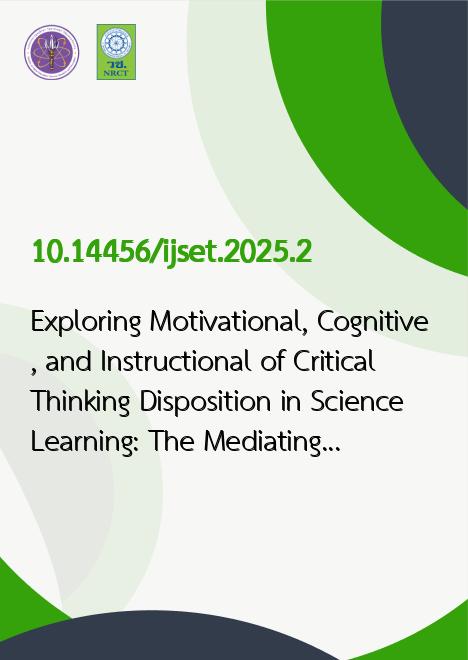
|
Exploring Motivational, Cognitive, and Instructional of Critical Thinking Disposition in Science Learning: The Mediating Role of Student Self-Regulation |
|---|---|
| รหัสดีโอไอ | |
| Creator | Thoriqi Firdaus |
| Title | Exploring Motivational, Cognitive, and Instructional of Critical Thinking Disposition in Science Learning: The Mediating Role of Student Self-Regulation |
| Contributor | Sabar Nurohman, Insih Wilujeng, Laifa Rahmawati |
| Publisher | Science Education Association (Thailand) |
| Publication Year | 2568 |
| Journal Title | International Journal of Science Education and Teaching (IJSET) |
| Journal Vol. | 4 |
| Journal No. | 1 |
| Page no. | 12-25 |
| Keyword | Critical Thinking, Disposition, Self-Regulation, SEM |
| URL Website | https://so07.tci-thaijo.org/index.php/IJSET/index |
| Website title | International Journal of Science Education and Teaching |
| ISSN | 2821-9163 |
| Abstract | Critical thinking disposition among students is essential for addressing contemporary challenges. However, the factors influencing students' critical thinking disposition and their interrelations within the context of science learning have not been comprehensively examined. This study aims to analyze the effects of self-efficacy, motivation, epistemological beliefs, and the academic environment on students' critical thinking disposition in science learning and explore the mediating role of self-regulated learning in connecting these factors to critical thinking disposition. This research employs a quantitative approach with an explanatory design, analyzed using Structural Equation Modeling (SEM). A total of 209 undergraduate students majoring in Science Education at Trunojoyo University, Indonesia, were selected using stratified sampling. Self-regulated learning strongly influences critical thinking disposition (coefficient: 0.889) and is significantly affected by epistemological beliefs (coefficient: 0.908). The learning environment contributes to critical thinking disposition (coefficient: 0.441), but the impact on self-regulated learning is small (coefficient: -0.122). Motivation negatively affects critical thinking disposition (coefficient: -0.451), suggesting that higher motivation is associated with lower critical thinking disposition. This counterintuitive result is due to the dominance of extrinsic, goal-oriented motivation over intrinsic motivation, potentially leading students to prioritize achievement over deep, analytical engagement. However, motivation positively influences self-regulated learning (coefficient: 0.141). Self-efficacy positively affects critical thinking disposition (coefficient: 0.260) but has a non-significant influence on self-regulated learning (coefficient: 0.041). Significance testing indicates significant relationships between epistemological beliefs and critical thinking disposition (t = 3.543, p = 0.000, coefficient = -0.234), epistemological beliefs and self-regulated learning (t = 22.088, p = 0.000, coefficient = 0.908), learning environment and critical thinking disposition (t = 15.282, p = 0.000, coefficient = 0.441), motivation and critical thinking disposition (t = 17.950, p = 0.000, coefficient = -0.451), motivation and self-regulated learning (t = 4.554, p = 0.000, coefficient = 0.141), as well as self-efficacy and critical thinking disposition (t = 10.873, p = 0.000, coefficient = 0.260). However, the relationship between self-efficacy and self-regulated learning was found to be non-significant (p = 0.431). Developing self-regulated learning can help students manage their learning processes more effectively and serve as a strategic approach to enhancing critical thinking skills. |